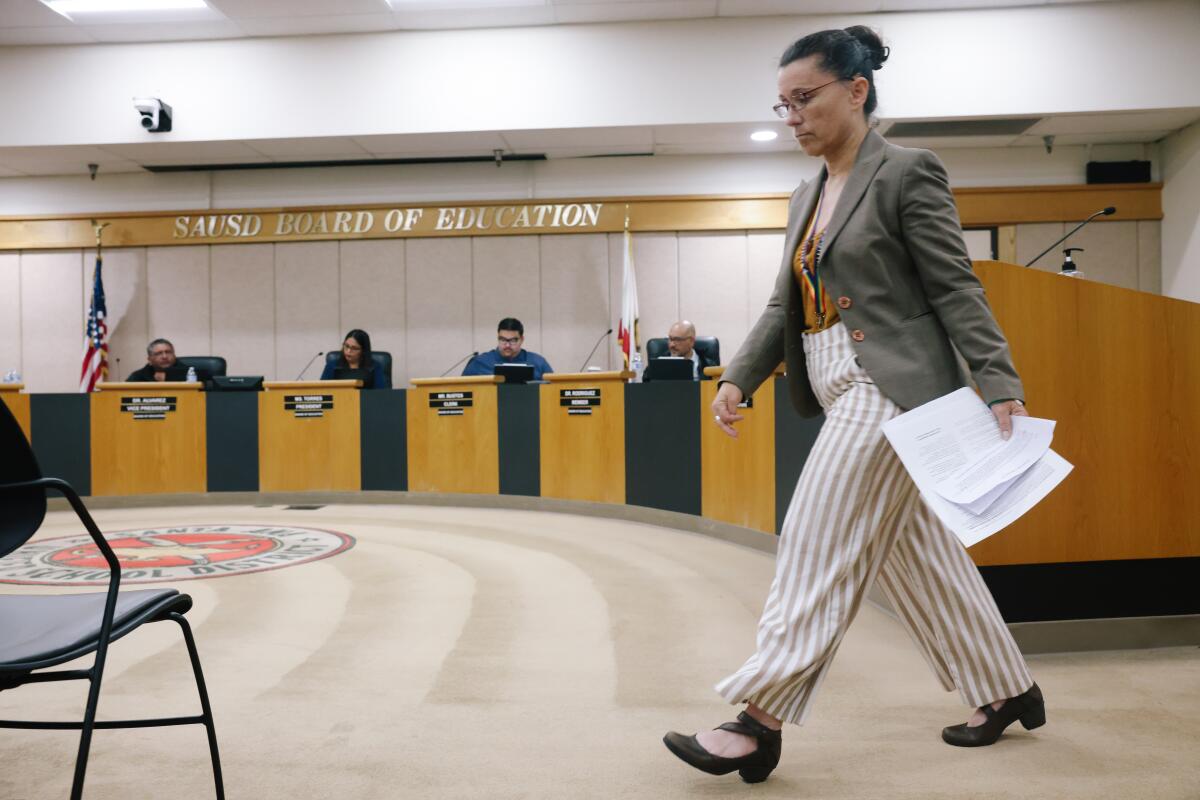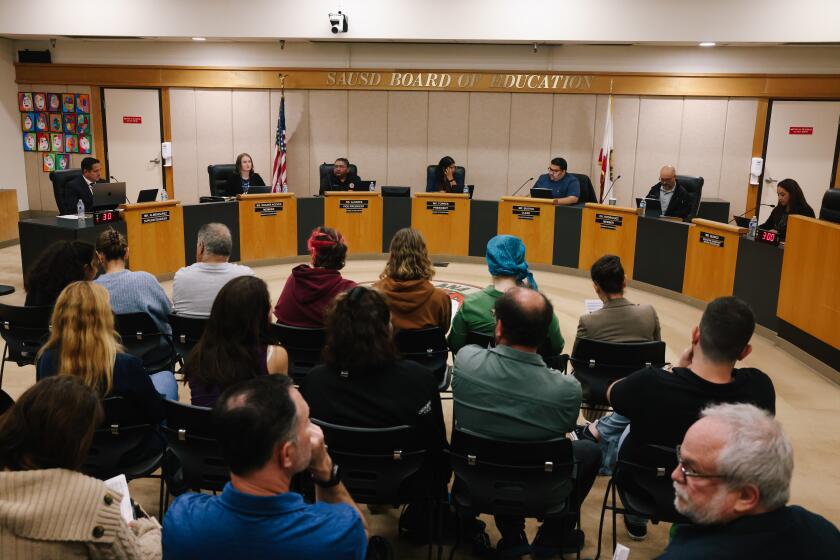Santa Ana Unified reaches settlement with Jewish groups over ethnic studies

- Share via
Three contentious ethnic studies classes will be shelved from instruction as part of a legal settlement reached between a coalition of Jewish groups and the Santa Ana Unified School District.
The terms of the Feb. 19 agreement, which is set to dismiss a lawsuit alleging that secrecy and antisemitism defined the district’s ethnic studies rollout, also requires that any future instruction on the Israeli-Palestinian conflict be taught in line with its own “controversial issues” policies.
“We’re very pleased with the settlement,” said Marci Miller, Brandeis Center’s director of legal investigations. “We believe it sends the right message that ethnic studies can’t be a vehicle for bringing antisemitism into a classroom. We’re watching other districts and states closely, and we’re hoping that they’re watching as well.”
The district first faced litigation in September 2023 over its ethnic studies curriculum.
An Orange County school district’s efforts to introduce lessons on the Israeli-Palestinian conflict have ignited emotional discourse among Jewish and Arab American community groups.
At that time, Jewish groups like the Brandeis Center, StandWithUs and the Anti-Defamation League alleged that the district’s board of trustees approved ethnic studies course outlines and materials on the Israeli-Palestinian conflict that were blatantly antisemitic.
Court documents filed in support of the suit last year further alleged that a Santa Ana Ethnic Studies Steering Committee secretively met in violation of the state’s open meeting laws and became a platform for antisemitism itself.
Documents obtained from the district appeared to show a committee meeting’s agenda item on ethnic studies in relation to the “Jewish Question.”
Text messages between senior district officials also discussed the merits of holding votes on ethnic studies courses on Jewish holidays like Passover to avoid protest from the public.
According to a district spokesman, the school board still has to give the agreement final approval.
“At no time has the District supported the teaching of instructional content to students that reflects adversely on any group on the basis of religion, race, ethnicity, or national origin as alleged in the lawsuit,” said Supt. Jerry Almendarez in a statement. “The settlement of this lawsuit affirms that principle and resolves any misunderstanding that may have occurred.”

As part of the agreement, if the district decides to bring Ethnic Studies World Histories, Ethnic Studies World Geography and Ethnic Studies: Perspectives, Identities and Social Justice, back to the board for approval, it has agreed to publish course outline drafts online at least a week before holding a public meeting.
Groups like the ADL, Jewish Federation of Orange County and Southern Californians for Unbiased Education are to be invited to meetings for input.
“Through the settlement, we’re bringing the process into compliance with the Brown Act and also with ethnic studies laws and California law in general,” Miller said. “When created in the dark, without public input, we saw some pretty heinously antisemitic materials brought into the classes.”
The district admits to no Brown Act violation in the settlement agreement.
Local Arab American groups packed school board meetings in 2023 to call on the district to keep the lessons. Pro-Palestinian activists saw them as a rare, critical lens on the Israeli-Palestinian conflict in the classroom.
Rashad Al-Dabbagh, executive director of the Arab American Civic Council, called the settlement “deeply troubling,” especially in a city where Palestinian American activist Alex Odeh was slain in an unsolved office bombing nearly 40 years ago.
“By stopping these ethnic studies courses from being taught, the district is denying students the opportunity to learn about a historically vilified and marginalized people — one that is actively facing genocide in Gaza,” he said. “Our schools should foster critical thinking, not censorship.”
Shira Klein, chair of history at Chapman University and an antisemitism expert, independently reviewed two of the classes in question and didn’t find them to be antisemitic. The scholar described the settlement as part of a “lawfare” strategy.
“This is what the Brandeis Center and groups like it do: They file lawsuits and complaints against individuals and institutions that criticize Israel, all in the name of protecting Jews,” she said. “This doesn’t make Jews safer, though. It silences everyone who wants to speak honestly about Israel, including many, many Jews.”
A lawsuit claims that an ethnic studies steering committee created by a Santa Ana school board met in secret and served as an incubator for antisemitic coursework. The district denies the allegations.
The trio of ethnic studies courses are all to be discontinued at the end of this school year.
Ethnic Studies World Geography was already on hold during litigation.
Ethnic Studies World Histories and Ethnic Studies Honors: Perspectives, Identities and Social Justice will be allowed to finish the current semester but content Jewish groups found objectionable, including passages from Michael Mann’s book “The Dark Side of Democracy: Explaining Ethnic Cleansing” and a glossary of terms from the Liberated Ethnic Studies Model Curriculum Coalition, will be stripped from instruction.
Future lessons on the Israeli-Palestinian conflict, whether in ethnic studies or other classes, are to adhere to the district’s “controversial issues” policies, which expects that teachers should “ensure that all sides of a controversial issue are impartially presented.”
Course materials stating or implying that Jewish people don’t have a right to self-determination or subject Israel to a double-standard of criticism cannot be presented outside of the policy.
“It’s vital that the conflict be taught but it is vital that it be taught correctly,” said James Pasch, the ADL’s senior director for national litigation.

The district also agreed to sever a $92,000 contract unanimously approved last August with the Xicanx Institute for Teaching and Organizing, which provided professional development for ethnic studies teachers throughout the district.
Plaintiffs in the suit objected to a Xito consultant’s political opinions on social media, including a post that wondered aloud how anyone could “support the settler colonial state of Israel?”
In another stipulation, the district admits that the Santa Ana Ethnic Studies Steering Committee no longer exists and won’t be reformed.
It will pay $43,000 to the Brandeis Center’s attorneys for out-of-pocket costs in settling the suit.
For Pasch, the legal fight underscores the value of the Brown Act, the state’s opening meeting law, in objecting to course content the ADL finds to be antisemitic.
“This settlement doesn’t just have ramifications within Santa Ana, or even just within the state of California,” he said. “There’s open meeting laws from coast to coast.”
All the latest on Orange County from Orange County.
Get our free TimesOC newsletter.
You may occasionally receive promotional content from the Daily Pilot.






